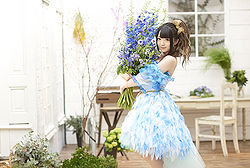Generasia would not be possible without tokyograph and all the wonderful people who've contributed over the past 15 years. Thank you!
Difference between revisions of "Chigiri -Kono Hiroi Hiroi, Jikuu wo Koete-"
m |
m (→Disambiguation) |
||
| Line 16: | Line 16: | ||
==Disambiguation== | ==Disambiguation== | ||
| − | There are currently two versions of "Chigiri -Kono Hiroi Hiroi, Jikuu wo Koete-" to be found in [[Ray (singer)|Ray]]'s discography. | + | There are currently two versions of "'''Chigiri -Kono Hiroi Hiroi, Jikuu wo Koete-'''" to be found in [[Ray (singer)|Ray]]'s discography. |
; Chigiri -Kono Hiroi Hiroi, Jikuu wo Koete- (契-この広い広い、時空を越えて-) | ; Chigiri -Kono Hiroi Hiroi, Jikuu wo Koete- (契-この広い広い、時空を越えて-) | ||
Revision as of 11:55, 17 June 2016

Yukyu no Uta Single Cover
- Artist
- Ray
- Song
- Chigiri -Kono Hiroi Hiroi, Jikuu wo Koete- (契-この広い広い、時空を越えて-; System -This Wide Wide, Beyond Time And Space-)
- Lyrics
- Kurosaki Maon
- Music
- Iuchi Maiko
- Other Information
- Arrangement: Iuchi Maiko
"Chigiri -Kono Hiroi Hiroi, Jikuu wo Koete-" is a song recorded by Ray. It was used as the first ending theme song for the game Juu Oni no Kizuna Sekigahara Kitan.
Disambiguation
There are currently two versions of "Chigiri -Kono Hiroi Hiroi, Jikuu wo Koete-" to be found in Ray's discography.
- Chigiri -Kono Hiroi Hiroi, Jikuu wo Koete- (契-この広い広い、時空を越えて-)
- Found on Kurosaki Maon & Ray's first split single, "Yukyu no Uta", as track #2.
- Chigiri -Kono Hiroi Hiroi, Jikuu wo Koete- <instrumental> (契-この広い広い、時空-とき-を越えて- <instrumental>)
- Found on Kurosaki Maon & Ray's first split single, "Yukyu no Uta", as track #5. This is the instrumental version.
| ||||||||||||||||||||||||
